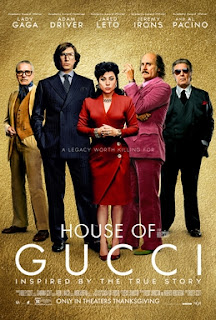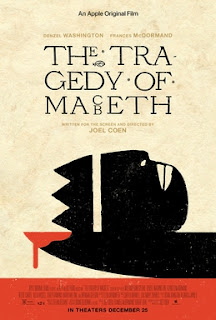One more for 2021; still in theaters...
House of Gucci--Lady Gaga plays Patrizia Gucci in Ridley Scott's dramatization of the family turbulence leading up to the 1995 shooting of her husband Maurizio. She's deliciously ripe and amiable in the first half of the story, depicting how she and Maurizio (Adam Driver) met in Milan in the late '70s, how he was willing to renounce his fortune over the disapproval of his father Rodolfo (Jeremy Irons) for the marriage, and how Maurizio eventually did join the family business, helped to revive the venerable but declining brand, and engaged in internal intrigues with his Uncle Aldo (Al Pacino) and cousin Paolo (Jared Leto).
Gaga is also believable and sad, if inevitably less fun, in the second half, when Maurizio drifts away from her. She grows desperate, and, under the influence of a psychic (Salma Hayek), dangerous.
The leading lady is strong; whether that makes House of Gucci's 158 minutes worth sitting through is another matter. Scott's usual panache seemed to desert him here. The pacing is flat, and the effect is of a competent, expensive but unexciting TV movie.
Still, there's undeniable camp value in watching this star-studded cast spew their dialogue at each other, in English but with radio-comedy Italian accents. Driver makes some effort to underplay, and comes across respectably. Pacino hams away enjoyably, and Irons, who's starting to resemble the late-vintage Boris Karloff, manages some impressively suave nastiness.
The shocker is Leto, who turns the hapless Paolo's lines into aggrieved sing-song arias. It feels like he was trying to see how far he could go before Scott asked him to tone it down. Apparently that didn't happen.







